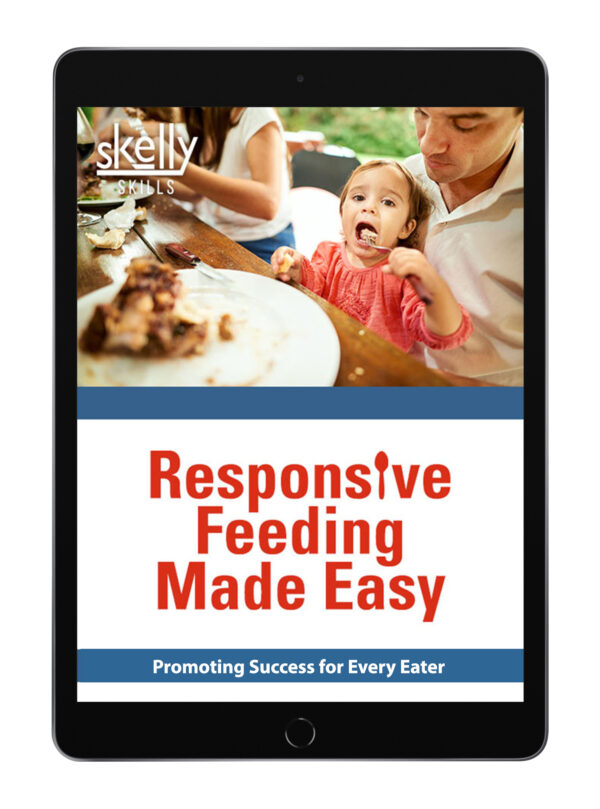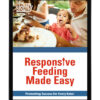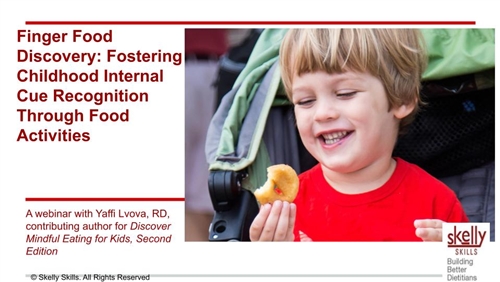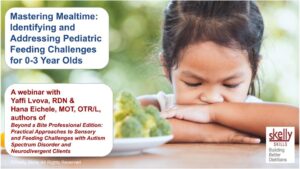

From: $149.00
On-demand Webinar Series! This 10-part online webinar series is designed specifically for WIC nutritionists and pediatric dietitians working with children aged 0-3! Through a multi-disciplinary approach, you’ll learn how to use responsive feeding (RF) in your practice from the combined expertise of a pediatric feeding team. Features:
NOTE: You will receive a link to access our training site to view the webinar series via email immediately after your purchase.
This course is CDR-approved for 17.25 CPEU for RD/RDNs and DTR/NDTRs, and CBDCE-approved for 17.25 CEU for CDCES’s. Please note course expiration date below.
CPEU/CEU: 17.25
Course Expiration Date: 05/02/2026. You have until that date to complete your CPEU Evaluation or Webinar Feedback Survey for this course.
Responsive Feeding Made Easy: Promoting Success for Every Eater On-Demand Webinar Series CE Course
Course Type: 740 – Self-study, Web-based
Includes CE Evaluation/Reporting Form: You will submit it online and receive your CE Certificate immediately.
Suggested Learning Level: 2
On-demand Webinar Series – Access and Watch Anytime! This webinar series is designed for dietitians working with kids aged 0-3 and their caregivers: WIC nutritionists, outpatient dietitians, early intervention dietitians, and public health dietitians. From applying a responsive feeding (RF) and division of responsibility (DOR) approach to various developmental stages of feeding to nutrition activities and advice for toddlers, this CE course has it all. You’ll learn from an interdisciplinary feeding team how to use responsive feeding to promote success for every eater while taking into account the individual needs of each of your pediatric clients.
Features:
Responsive feeding for breastfeeding, readiness signs for starting solids, special considerations and feeding difficulties
Review of feeding methods, adapted baby-led weaning for special circumstances, gag reflux and choking hazards, special nutritional considerations
Sample dialogue, case studies, and counseling suggestions for developmental delays, common concerns, and nutrients, allergies, and weaning
Nutritional considerations for toddlers, straw cups and open cups, self-feeding and mealtime routines, helping in the kitchen
Sample dialogue, case studies, and counseling suggestions for picky eaters, constipation, bloating, and tummy pain
Overview of division of responsibility, repeat exposures, picky eaters, atypical eating challenges including ARFID, atypical picky eating and sensory processing disorders, review of portions and daily food amounts, family meals and restaurants, mealtime routines
Sample dialogue, case studies, and counseling suggestions for constipation and core strength, developmental delays, food as reward and under-eating
Microbiome and food considerations
Guidelines for use of included Cheat Sheets with a sample counseling scenario
The Feeding Team’s members and role, sensory system, helpful terminology, sensory processing red flags, and feeding therapy
Taking a responsive feeding approach to pediatric feeding sets both the child and the caregiver up for success. Learn how to incorporate responsive feeding and tips from a pediatric feeding team into your counseling sessions. Responsive Feeding Made Easy: Promoting Success for Every Eater on-demand webinar series is an excellent resource to take your practice to the next level.
Released 2023. 10 webinar series. 17.25 CPEU CE Course. See the PIs tab for suggested Performance Indicators.
Discover Skelly Skills’ other WIC, Public Health and Pediatric Nutrition CE courses.
Learn more about presenters Cassie Kleinfelder, OTR/L, CLC, Rachel Cunningham, CCC-SLP and Mary-Walker Hall, MS, RDN.
CPEU/CEU: 17.25 NOTE: Course Expiration Date: 05/02/2026. You have until that date to complete your CPEU Evaluation or Webinar Feedback Survey for this course.
1.1 Demonstrates and maintains competence in practice.
1.1.2 Pursues and embraces opportunities to advance practice.
1.1.5 Integrates new knowledge and skills into practice.
1.1.8 Collaborates with others, seeks counsel and makes referrals as needed.
1.4 Respects client autonomy to make decisions about proposed services.
1.7 Applies cultural competence and consideration for social determinants of health to show respect for individuals, groups and populations.
1.7.3 Develops awareness of one’s own personal beliefs and values to inform and reduce biases.
1.7.5 Applies knowledge of cultural foods, religious traditions, eating patterns and food and nutrition trends.
2.1 Adapts communication methods and skills to meet the needs of audiences.
2.1.1 Assesses the communication needs of individuals, groups and populations to provide effective communication.
2.1.3 Tailors messages and communication methods to meet the needs of target audiences.
2.2.1 Observes non-verbal and social cues and responds appropriately.
2.3.5 Collaborates with others when knowledge, skill or experience are beyond their competence level.
2.4.2 Incorporates team members’ knowledge, expertise and personal skills into team processes.
4.1.1 Demonstrates effective problem solving and professional judgment to address needs.
4.1.2 Interprets and integrates evidence-based research and literature in decision-making.
4.1.6 Recognizes situations where nutrition and dietetics service should be adjusted, limited, modified or discontinued.
4.2.6 Integrates relevant information with previous learning, experience, professional knowledge, and current practice models.
4.2.8 Evaluates the effectiveness of plans and decisions and make adjustments when needed.
6.3.2 Utilizes innovative ways to disseminate research findings considering the target audiences.
8.1 Interprets and applies current food and nutrition science nutrition and dietetics practice.
8.1.1 Interprets and applies evidence-based literature and standards for determining nutritional needs of target audiences.
8.1.2 Integrates knowledge of biological, physical, and social sciences with knowledge of food and nutrition to make decisions related to nutrition care.
8.1.4 Integrates knowledge of macro- and micronutrients for digestion, absorption and metabolism throughout the lifespan in practice.
8.1.5 Demonstrates knowledge of nutrient requirements throughout the lifespan, and their role in health promotion and disease prevention.
8.2 Applies current knowledge and skill in the management of a variety of diseases and clinical conditions.
8.2.3 Analyzes new information and how it impacts medical nutrition therapy.
8.4 Critically evaluates the safety and efficacy of integrative and functional medicine approaches and interventions
8.4.1 Critically evaluates the safety and efficacy of traditional and pharmaceutical models.
8.5.2 Develops or modifies recipes, menus, and meals using sensory perception and other food components.
8.5.4 Takes into consideration client/patient choices, beliefs, food sensitivities, allergies, and accessibility and affordability of food.
9.1.3 Identifies and analyzes factors that influence change in behaviors.
9.2.1 Evaluates learning needs of individuals and target groups.
9.3.2 Develops a variety of learning activities based on a plan of action and the needs of individuals, groups, communities and populations.
9.3.4 Takes into consideration the cultural needs of audiences and makes appropriate modifications to education materials.
9.4 Provides nutrition and dietetics education to a variety of individuals, groups and populations.
9.4.1 Takes into consideration special needs and disabilities and provides accommodations.
9.4.3 Adjusts teaching plans and delivery to meet the needs of specified individuals, groups and populations.
9.4.4 Selects and uses appropriate content and teaching methods to meet individual and group needs.
9.6.1 Assesses client/patient nutritional needs and appropriateness of the counseling.
9.6.2 Applies a variety of counseling theories, psychological methods and strategies that empower clients/patients to make changes.
9.6.3 Applies counseling principles and evidence-based practice when providing individual or group sessions
9.6.6 Determines client/patient expectations and aspirations and manages situations wherein these expectations cannot be met.
9.6.8 Develops counseling or coaching goals in collaboration with clients.
9.6.10 Evaluates the effectiveness of counseling or therapy and makes modifications as required.
9.6.11 Refers client/patient to appropriate professionals when counseling, therapy or mental health status is beyond competence and legislative scope of practice.
10.1 Conducts nutrition screening to identify individuals who require a nutrition assessment.
10.1.4 Determines appropriate service and referral needs based on screening data.
10.2 Conducts a nutrition assessment to establish nutrition diagnoses, prescriptions, and care plans.
10.2.1 Selects valid and reliable tools to conduct comprehensive nutrition assessments.
10.2.2 Interviews clients/patients and reviews health records to collect information about medical history and food and nutrition intake.
10.2.5 Conducts nutrition-focused physical examinations to determine nutritional statuses of clients.
10.2.6 Collects and analyzes anthropometric and body composition data to contribute to nutrition diagnoses.
10.2.7 Performs calculations to determine nutritional requirements by identifying and utilizing patient-appropriate formula.
10.2.10 Gathers and evaluates information related to behaviors, beliefs, knowledge, and client/patient attitudes that influence nutrition and health.
10.2.12 Gathers information that affects intake and nutrition and health status (e.g., cultural, ethnic, religious, lifestyle influencers, psychosocial, and social determinants of health).
10.2.13 Analyzes diagnostic test results (e.g., fluoroscopy, swallowing evaluation, enteral feeding tube placement) to inform nutrition diagnoses.
10.2.14 Analyzes and synthesizes assessment data and findings to establish nutrition diagnoses.
10.2.14 Formulates PES (problem, etiology and signs/symptoms) statements to communicate nutrition diagnoses.
10.3.1 Establishes goals and desired outcomes in collaboration with clients/patients.
10.3.2 Determines factors impacting client/patient progress in meeting goals and adjusts nutrition care plans accordingly.
10.3.3 Prioritizes specific nutrition problems to inform nutrition care plans and processes.
10.3.4 Selects interventions intended to resolve or improve nutrition diagnoses.
10.3.5 Establishes nutrition care plans, defining the time, frequency, and duration of interventions.
10.3.6 Develops nutrition prescriptions to communicate clients’/patients’ customized diet and nutrition needs.
10.3.7 Recommends therapeutic diets and dietary and oral nutrition supplements based on PES statements.
10.3.8 Initiates or modifies orders for therapeutic diets and dietary and oral supplements based on PES statements.
10.3.9 Leads the implementation of nutrition interventions in collaboration with clients/patients and the interprofessional team.
10.4.4 Considers client/patient factors, nutritional impacts, indications, side effects, contraindications, benefits, risks, alternatives and foundational sciences when prescribing, recommending or administering nutrition-related drug therapy.
10.4.5 Implements, initiates, or modifies nutrition-related pharmacotherapy orders that address client/patient needs.
10.5.1 Reevaluates and adjusts plans of care to support client/patient health goals.
10.5.2 Monitors and identifies factors affecting client/patient progress in meeting goals.
10.5.3 Adjusts interventions based on client/patient progress in meeting established goals.
10.5.4 Establishes new goals and nutrition care plans when original or interim goals are met.
12.2.1 Identifies determinants of health and influences on population health status.
Only logged in customers who have purchased this product may leave a review.
Skelly Skills is a provider of continuing education for dietitians (RD/RDNs), certified diabetes care and education specialists (CDCESs), registered nurses (RNs) and diet technicians, registered (DTR/NDTR). We provide CPE, (often called CEU, CE, and CPEU) for all of these groups, and all of our courses are approved for CE by the Commission on Dietetic Registration (CDR) and the CBDCE for CDCESs. Skelly Skills receives no commercial support and does not accept advertising or sponsorship of any kind.

CPEU/CEU: 20

CPEU/CEU: 1

CPEU/CEU: 1

CPEU/CEU: 1


Purchase your webinar and receive a link to the webinar immediately.
Watch your webinar and then submit the CE Feedback Survey form by the course expiration date.
After submitting your CE Feedback Survey, you will be able to download your CPEU/CEU certificate as a pdf and keep for your records.

We use cookies to ensure you get the best experience. By using our website or clicking "accept", you consent to cookies.
Nicole Silber, RD, CSP, CLC, Pediatric and Family Nutrition/Lactation Counselor –
This robust course offers a comprehensive, yet practical, approach to responsive feeding. You will walk away with useful knowledge that will help improve your clinical and counseling skills.
Tok-Hui Yeap, RD, CSP, LD, Pediatric Nutritionist –
This is a great resource for the RD who is new to the pediatric feeding challenges to learn the best practice in guiding families to feed their infant/toddler in a more responsive environment. The course will take you step by step through each developmental stage from infancy through toddler from how to feed to red flags to watch out for and strategies to help address the feeding challenges that babies often go through.